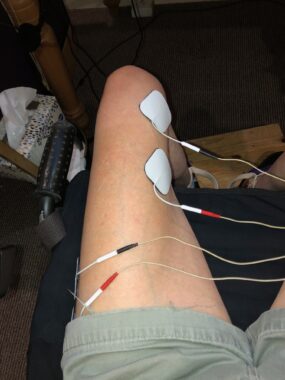Primary progressive MS was like a bad houseguest, but I adapted
Written by |


Kristin Hardy considers herself happy and healthy — absent 22 years with PPMS, of course. (Photos courtesy of Kristin Hardy)
Day 22 of 31
This is Kristin Hardy’s story:
In 2001, I started experiencing symptoms of what rapidly manifested as primary progressive multiple sclerosis (PPMS). Like a bad houseguest, it arrived without warning or invitation. It disrupted all my plans and simply never left. (Oh, and also like a bad houseguest, it ate the last chocolate Häagen-Dazs.)
All multiple sclerosis (MS) types will mess with your mind, but PPMS is special. There’s no remission. It never stops long enough for you to get your bearings. It just does its thing. On the upside, that thing is very predictable. There is no waking up in the morning to find I’ve lost a function I could perform the previous day. On the contrary, when I wake up in the morning, I know exactly what I’m going to face.
And that can be a very good thing.

Hardy uses neuromuscular electrostimulation five days a week to promote neuroplasticity and strengthen targeted quad muscles. It makes it easier for her to stand up and stay that way.
Let me explain. When I was diagnosed, there were no treatments for progressive MS. I remember walking out of an early neurology appointment thinking, “Well, crap, I guess it’s up to me.”
I’m an engineer by training, so problem-solving is second nature to me. I stay up to date, I do my research, I follow the science. I started taking antibody-based therapy in 2005, which has helped to slow the progression to a degree.
I was a hardcore weightlifter, runner, and biker before my diagnosis, so I’ve always been religious about physical therapy. But the real advances happened when I discovered neuromuscular electrostimulation. This is a technique that helps even those with limited voluntary function promote neuroplasticity to reroute nerve signals. It helps me improve functions like sit-to-stand, balancing, hand and arm function, and foot drop.
Now, I’m not talking about a miracle cure here. After more than 20 years with the disease, I spend a lot of time in a wheelchair. But I’m also capable of getting out of it. I can do knee bends. I can stand for an hour or two. On a few good days, I can wrestle out some steps. I can work full time. Most of all, and this is the extraordinary part, if I follow my routine, I can be sure that the next morning, I will be able to do everything just a little bit better than the day before.
Again, these are just incremental improvements. But when you have an incurable progressive disease, being able to exert any control over it at all feels like a tiny miracle.
Here’s wishing the same to all of you.
In recognition of Multiple Sclerosis Awareness Month in March, the MS Community Spotlight campaign features a series of stories highlighting the real-life experiences of people affected by MS, written in their own words. Follow us on Facebook, Instagram, and Pinterest for more stories like this, using the hashtag #MSSpotlight, or read the full series.
